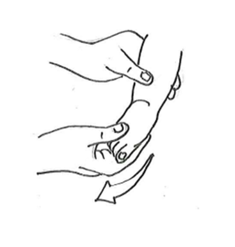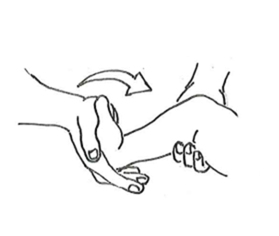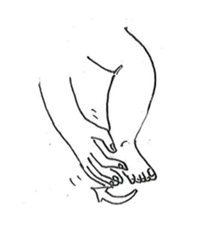- Reference Number: HEY1497/2024
- Departments: Paediatrics, Physiotherapy
- Last Updated: 31 July 2024
What is Positional Talipes Equino Varus (PTEV)?
It is a common presentation in newborn babies where the foot or feet point inwards and downwards and can affect one or both feet.
The condition is usually caused by the position the baby has been laid in during the pregnancy.
Some common predisposing factors include:
- Multiple pregnancy
- Large baby
- Breech presentation
- Decreased water in utero
All these factors determine how much the baby can move around and therefore how much they can change the position of the feet.
At birth it may be noticed by a parent or midwife, or it maybe picked up when the feet are examined during the newborn baby examination by the Antenatal ward staff.
PTEV feet are correctable by gently stretching the feet and they will be able to be moved throughout their full range. This position should resolve by itself within the first few months.
It maybe helpful to give your baby some time out of their clothing to allow them to kick and stretch their feet. When they are in clothing ensure it is not too tight around their feet, so they have enough room to move.
Stretches
Gentle stretches can help correct the position and should be performed regularly throughout the day, ideally when your baby is settled and relaxed.
The following stretches should be easy to perform and should not cause any pain to your baby. However, your baby may get upset due to the fact that their foot is being held still, but they should quickly settle after the stretch.
Each stretch should be held for 20 to 30seconds.
Stretch 1. Gently stretch your babies’ foot out towards the little toe

Stretch 2. Gently stretch your babies’ foot up towards the shin

Stretch 3. Gently stroke or tickle the outside of your babies’ foot to encourage them to actively move the foot outwards and upwards.

You should gradually notice your baby holding the foot in a more neutral position over the next few weeks.
Information
Your baby maybe referred for a routine hip ultrasound scan as there is a very small risk of associated hip problems. You can mention any concerns about your babies’ foot at this appointment and an assessment can be arranged.
You should request further assessment if you are concerned that your babies’ foot seems painful to stretch or if the foot feels stiff or if it is not fully flexible.
Some babies rest their feet in an inwards and downwards position as long as it is flexible when stretched there is no need to be concerned, and it should fully resolve within a few months.
This leaflet was produced by the Children’s Physiotherapy & Occupational Therapy Department, Hull University Teaching Hospitals NHS Trust and will be reviewed in July 2027.

